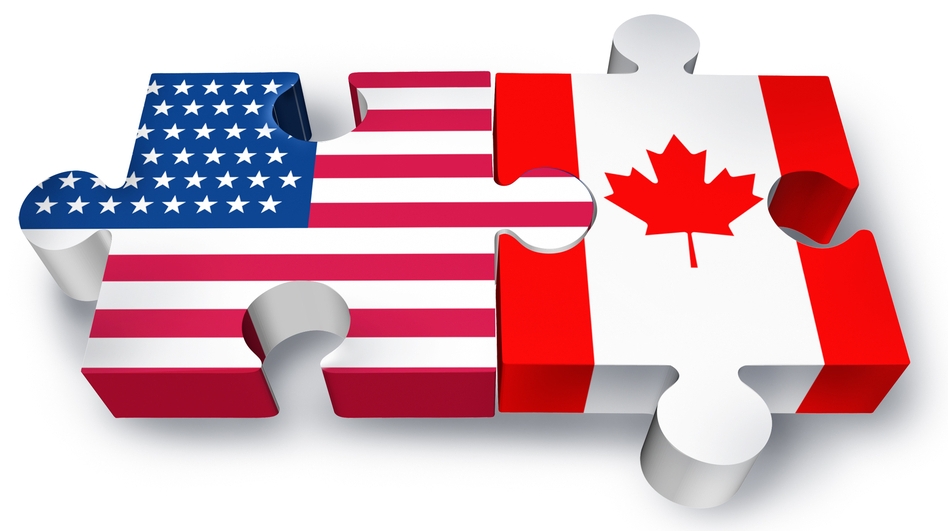In recent years, the sheer number of Americans looking to move to Canada has rapidly increased. As a result of this, we created this step-by-step guide to moving from the US to Canada.
As you read on, you’ll learn more about your Canadian immigration options as a US citizen, and the best route to Canadian permanent residence.
If you’re considering making the move across the border to Canada from the U.S., You’re not alone. In 2019 alone, over 10,000 American residents made the switch to Canada.
Moving to Canada can open doors to lots of opportunities for both you and your family as regards jobs, health, and education.
Before moving to the great white north to visit, study, or work you’ll need to know your best options to legally enter and stay in Canada.
How can I move to Canada from the US as a permanent resident?
The most popular ways for immigrating to Canada from the US is through Canada’s Express Entry system.
The Canadian Express Entry is used to process the huge chunk of Canadian immigration applications for three of the country’s economic immigration programs. If you qualify for any of the below-listed programs, you might be eligible for Canadian permanent residence through Express Entry.
80% of the applications for permanent residency submitted via Express Entry are processed within 6 months, this makes it one of the quickest immigration systems in the world.
There are three federal economic immigration programs:
- Federal Skilled Worker Program (FSW)
- Federal Skilled Trades Program (FST)
- Canadian Experience Class (CEC)
These programs are highly competitive and the comprehensive system ranking (CSR) tool is utilized. That means, they’re score-based, don’t forget that sometimes meeting the criteria for any of these programs is not enough. This is because, after scores are assigned to you using your credentials, you’d be ranked against other candidates, and only the highest-ranking candidates will be invited to apply to immigrate to Canada.
Additionally, each province has its own Provincial Nominee Program (PNP) which offers immigration programs for skilled workers depending on their geographic and demographic needs.
Can a US permanent resident work in Canada?
If you are planning to move to Canada to work from the U.S, there are different kinds of work permits that would enable you to achieve this, depending on your circumstances:
1. NAFTA Work Permits: The North American Free Trade Agreement (NAFTA) is an economic agreement between the United States, Canada, and Mexico which is aimed at facilitating trade between them and among other things, allowing specific categories of temporary workers into each other’s markets.
2. Employer Specific Work Permit: If you possess a valid job offer from an employer in Canada, you might be eligible to enter Canada on an employer-specific work permit. An employer-specific work permit usually needs a Labour Market Impact Assessment (LMIA), which is a document that shows the employer tried to employ a Canadian citizen or a permanent resident to fill the role before it was given to a foreign national.
3. Spousal Open Work Permit: If your spouse or common-law partner is a temporary foreign worker or international student in Canada, you are eligible for a spousal open work permit.
Can I move to Canada from the US as an international student?
There are several advantages to studying in Canada compared to the U.S, like lower tuition rates, shorter visa processing times, and the opportunity to start work immediately. A Canadian study permit allows you to work 20 hours weekly when school is in session and 40 hours weekly during breaks and holidays.
While the ability to work is great, the ability to purchase more items with fewer dollars is even better. Luckily, the cost of living is lower in Canada than the U.S.
Moving to Canada from the US through a study program can be beneficial to your long-term immigration plans. In Canada, you can obtain a Post-Graduate Work Permit (PGWP) after graduation from most programs of study. Your PGWP is valid for the same duration as your study permit, up to three years.
Canadian work experience and a degree from a Canadian institution drastically increase your probability of successfully acquiring Canadian permanent residence.
How much does it cost to immigrate to Canada from the US?
Government-assigned processing fees must be submitted along with most visa applications. The said fees are the same regardless of your nationality. Bur these processing fees vary depending on which program you are applying for.
It costs precisely $155 to apply for a Canadian work permit, and $150 to apply for a Canadian study permit.
When applying for the Canadian permanent residence, there is a $490 Right of Permanent Residence fee (RPFR), that must be paid once the application for permanent residence has been approved.
Visiting Canada
If you are entering Canada with a valid US passport you do not require a Canadian visa or an electronic travel visa (eTA). However, You will be required to have a visitors visa to enter Canada if you aren’t a Canadian citizen, a permanent resident, or from a visa-exempt country, such as the US. If you happen to be a US Green Card holder, you would not need a Canadian visa to enter Canada. However, if you’re flying to or transiting through a Canadian airport, you would require an eTA.
With a visitors visa, you can stay legally in Canada for up to 6 months for the purposes of traveling, looking for work, or even participating in specific short-term study programs. You, however, cannot work or remotely apply for a work or study permit from within Canada.
Inadmissibility
After meeting the eligibility requirements to migrate to Canada from the USA, you’d also need to be admissible into Canada. Inadmissibility refers to people who otherwise be eligible for immigration, but who are not admissible. There are two main categories of inadmissibility:
- Medical inadmissibility
- Criminal inadmissibility.
If you possess a medical condition that has a likelihood of exposing Canadians to danger, or imposes too much demand on Canada’s publicly funded health and social services, you would be medically inadmissible.
If you have a criminal record, you would be criminally inadmissible to Canada. Even little crimes that didn’t result in jail time can cause major problems when you try to migrate to, or even visit, Canada from the USA.
Settling in Canada
After you’ve known you’d be migrating to Canada from the US, you’ll need a solid plan to get you settled in quickly like, finding a place to live, finding schools and/or work, and arranging your finances and healthcare. Luckily Canada has some of the best newcomer services in the world and they’re free of charge, so just use the one closest to you, you can get that by going on the official government immigration website.
Employment
A major contrast in employment between the US and Canada is at-will employment. At-will simply means an employee can be terminated for any reason, at any time, without warning, and as someone who’s spent time in the US, you’d know it’s a common practice in the US. After termination, the employer has no obligation to provide severance to the employee.
However, in Canada employees must receive two full weeks’ notice prior to their termination or two weeks’ full salary or a severance package, depending on the number of years worked.
Another major contrast between the US and Canadian work laws is the rights of workers to take maternity or paternity leave when necessary.
Although eligible American employees may take up to 12 weeks of maternity leave, it is unpaid.
In Canada, the laws are much more different. Both parents can take a standard paid leave of 35 weeks or even an extended leave of 61 weeks. During this leave, a portion of the employee’s salary is paid and their job is kept until when they will return.
Taxation
Immigrating to Canada from the US won’t give you the leeway to stop filing or even paying US taxes. The US and Canada have treaties in place to stop fiscal evasion and double taxation. While filing taxes in both countries may look similar, with comparable tax structures and lots of paperwork, there are some major differences. The biggest difference has been, if you migrate to Canada, you’d be paying more taxes.
In situations when you are married or in a common-law partnership, there are no joint tax returns. In Canada, each person must file his/her own tax return. This doesn’t mean that you cannot add your and your partner’s expenses, such as childcare and charitable donations.
Accommodation
Once you’ve concluded on moving from the US to Canada, you’d need to find a house to live in. Searching for a property to rent or own is similar in both countries. You can use online platforms, an agent, or through newspaper ads, request a visit, and then look at the property. Once you’ve found a place you like that falls within your budget, you’d need to sign the lease for the specific number of months you intend to stay.
Healthcare
The biggest difference between the US and Canada in my opinion is healthcare. In Canada, all Canadian citizens and permanent residents have unlimited access to their home province’s health insurance program that covers all necessary hospital and physician services. In the US, healthcare is typically provided by the company you work for. However, if your employer is not part of an insurance program or you’re jobless or any number of other reasons, you might be unable to afford private insurance in the States.
In 2017 alone, almost 11% of the US population was uninsured, this isn’t due to Americans not getting sick, this high percentage is because they can’t afford medical care.
Canadian Citizenship
To be eligible to apply for Canadian citizenship you must have a permanent resident (PR) status in Canada and have been physically present in Canada for at least 1095 days during the prior five years before you signed your application. All your time in Canada as a student, visitor, or worker before becoming a permanent resident within the last five years will tally as one half-day, raking up to a maximum of 365 full days, towards your physical presence in Canada. So, the sooner you start staying in Canada, the better for you if you want Canadian citizenship.







